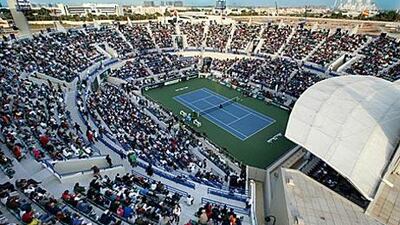Anybody who witnessed the stunning launch of the Capitala World Tennis Championship last January will probably be rushing out for tickets for the second staging of the three-day, six-man spectacular which kicks off on New Year's Eve. Even though the pre-season exhibition lacked official ATP Tour status, it proved a resounding success as six of the world's top 10 players slugged it out in a full-on battle for the solitary prize of US$250,000 (Dh917,000).
"We knew these guys were not going to be lobbing balls back to each other," said John Lickrish, managing director of Flash Entertainment who were responsible for the staging of the event at the UAE capital's Zayed Sports City complex. "And that's what happened. It was really aggressive tennis from start to finish over all three days. The crowd loved it and so did we. I was grinning from ear to ear afterwards."
Exhibition it most certainly was not as Britain's Andy Murray rose superbly to the occasion to record an outstanding series of victories over three splendid days, culminating with an epic final conquest of the then world No 1 Rafael Nadal. "That final was unbelievable," reflected Lickrish. "It was a real bonus after all that had gone before and it was like the cherry on the top of our ice cream."
A capacity crowd of 5,000 were kept captivated for the best part of three hours in perfect conditions as the super-fit Murray wore down the muscle-bound Nadal in even more impressive fashion than he had accounted for Roger Federer on the previous day. Nadal, who overcame Nikolay Davydenko in his semi-final, and Federer were seeded to play in the final then and they are scheduled to meet again in a battle for the bumper purse on the evening of January 2.
If either of those two big guns fails to make the final shoot-out, they will be consoled by the prospect of an extra match this time - a third-place play-off which is a welcome amendment to the schedule from the inaugural year. "We've added that extra match because the players wanted it," said Greg Sproule, managing director of International Management Group (IMG) who are hosting the showpiece event.
"The players want that opportunity to have another serious practice match against one of their leading rivals because they see Abu Dhabi as an excellent place to start their preparations for the Australian Open [which starts two weeks later]." The Capitala tournament has picked up on that by creating a playing environment identical to Melbourne Park, home of the year's first grand slam tournament.
The court surface and the tennis balls will be exactly the same as in Australia. Sproule ventured that the Abu Dhabi event would resemble the latter stages of a grand slam. "These players need no introducing," he said as he went through the supporting cast to Federer and Nadal. Jo-Wilfried Tsonga, an artful Frenchman is a former Australian runner-up while Sweden's Robin Soderling was a shock finalist in this year's French Open in which he sensationally defeated Nadal.
Russia's Nikolay Davydenko was once ranked as high as three in the world while Spain's Fernando Verdasco is emerging as one of the most exciting players of his generation. "It has a grand slam quarter-final feel to it," Sproule concluded. It is also the intention to appeal to the grassroots of the sport by creating a tennis village atmosphere. Entrance to the areas surrounding the main arena is free of charge in the hope of providing incentives to Emiratis and expats to take up the sport.
As Flash spokesman Lickrish put it: "Having the sport's top men's players on board is hugely exciting and we hope that with their support we can further encourage the local community to get involved with what truly is a fantastic sport. "We hope not only to encourage the people of Abu Dhabi to enjoy watching the professionals play but also to spur them on to take to the court themselves." Lickrish defended his company's decision to call an unofficial exhibition event a "world championship".
He said: "For us it is the world tennis championship because we have the best players from around the world coming here. And long may that continue." The curtain goes up on the three-day competition at 3pm on December 31 with the first of the preliminary round matches involving any combination of Tsonga, Davydenko, Verdasco and Soderling. The two players who are not drawn together in that opening match will feature in the concluding match on the opening day with the winners going through to face Federer and Nadal on the Friday.
The final is due to take place at 5pm on the Saturday or immediately after the third-place encounter. wjohnson@thenational.ae

